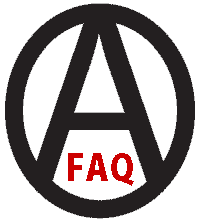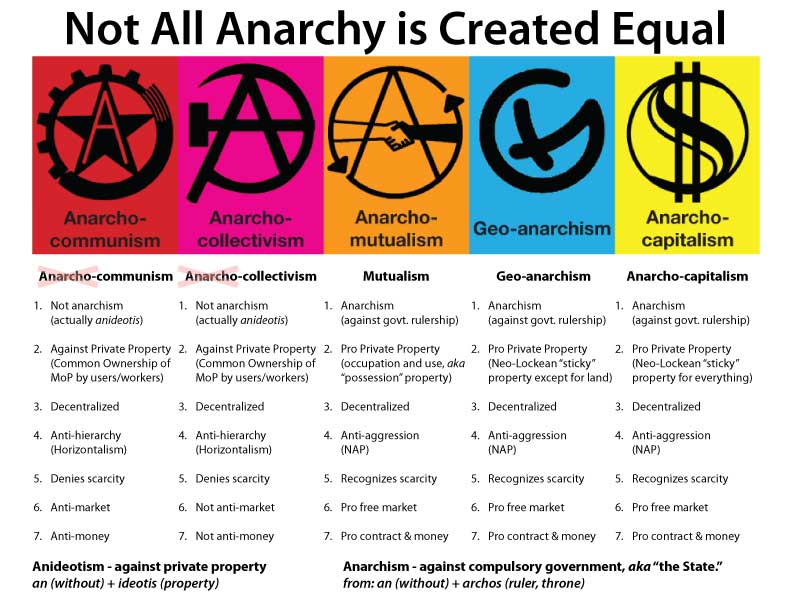
The Anarchist FAQ
Liberty is the mother, not the daugher, of order.
IV. Are “anarcho”-communists anarchists?
Can an anarchist use physical force to impose his property norms on non-consenting others? This is a difficult question, whose answer depends on the context. It would seem that enforcing the consensus norms of a local community, especially when there is opportunity for dissenters to opt out cheaply, is perfectly okay. On the other hand, if there is a monolithic “norm” preventing the expression of alternative norms, then imposition seems to be rulership.
The majority of people today who claim to be both anarchist and communist fail the first descriptor. Why? Because these “anarcho”-communists want to impose a monolithic property norm on everyone by force. Their collectivist norm. By self report, these “an”-coms would prefer to abolish private property and keep a State, than to abolish the State and keep private property. By this admission, they admit that they are, at heart, anti-property - anideotist - rather than anarchist.
There have been no formal surveys on this that I am aware of, but my informal inquiries indicate that only about a quarter of self-described anarcho-communists are actually anarchist. One Facebook poll asked whether they would prefer statelessness with private property, or a State and no private property. Guess which the self-labeled ancoms preferred? The State! By about three to one.
This makes it clear that “anarcho”-communists are misnamed. Since their primary consideration is the end of private property and (what they call) capitalism, the proper name is anideoto-communist. An - without. Ideotis - property. They are against property, not against authority, the State, or rulership. So call these people “anideotists” - anti-propertarians in Greek. Anarcho-capitalists and mutualists are genuine anarchists, being anti-state in principle.
IV.A - What is the definition?
Anarcho-socialists often appeal to tradition, claiming that anarchism has always been considered socialist. Perhaps they don’t realize that word meanings and political ideas change and grow over time. I find it interesting that Peter Kropotkin, founding father of anarcho-communism, wrote that anarchism - as a philosophy - was solely about anti-statism.
Anarchism [is] the name given to a principle or theory of life and conduct under which society is conceived without government - harmony in such a society being obtained, not by submission to law, or by obedience to any authority, but by free agreements concluded between the various groups, territorial and professional, freely constituted for the sake of production and consumption, as also for the satisfaction of the infinite variety of needs and aspirations of a civilized being.
— Kropotkin, Encyclopedia Britannica (1910)
Kropotkin, later in the same article, wrote about anarchist writers of his time who were predominantly socialist. Anarcho-socialists sometimes crib these descriptions of Kropotkin’s contemporary anarchism and misrepresent them as Kropotkin’s definition.
Kropotkin’s anti-statist definition of anarchism was shared by Benjamin Tucker:
A Socialist may or may not be an Anarchist, and an Anarchist may or may not be a Socialist. Relaxing scientific exactness, it may be said, briefly and broadly, that Socialism is a battle with usury and that Anarchism is a battle with authority. The two armies — Socialism and Anarchism — are neither coextensive nor exclusive; but they overlap.Other lesser known theorists concurred, e.g.
— Benjamin Tucker, Armies that Overlap, Instead of a Book
As the word ‘anarchy’ etymologically signifies the negation of governmental authority, the absence of government, it follows that one indissoluble bond unites the anarchists. … Whoever denies that the intervention of government is for human relationships is an anarchist.
— Émile Armand, Anarchist Individualism as Life and Activity (1907)
IV.B - How did communist anarchism get perverted?
How did the genuine anarcho-communism of Kropotkin get highjacked by the communists who now self-label as “anarcho-communist?" There seem to be two processes at work: 1) a switch of priorities, and 2) picking easier targets.
First, the anti-property agenda provides easier and sexier targets. An anarchist’s first priority is destroying the violence-power of the State. But this is extremely difficult. It requires indirect means and hard work. Building alternative structures takes time and effort to complete. It is much easier to protest news events and government votes on policy. It is easy to protest Walmart and Whole Foods while ignoring Raytheon and Boeing.
So over time, their priority switches from anti-state to anti-property - from anarchist to anideotist. This is a prime example of right-wing opportunism. Since being anti-property is easier, ancoms tend to give the anideotis part of their program priority over the anarchist part. Eventually, they are no longer anarchist.
There is another, less common, way that some ancoms become “an”coms - by taking up a non-standard definition of State. While the consensus among anarchists is that the State is an effective monopoly on the legal use of force in a particular geographic area (Max Weber) and/or the institution of sustainable plunder (Franz Oppenheimer), some anarcho-communists self-servingly define the State as any social system that utilizes private property.
In any case, the “anarcho”-communist loses his anarchist status the moment he puts property preference above eliminating the State. A real anarchist wants to abolish the State, and then let reality determine the most efficacious norms for humankind. Let the people figure it out. If you believe in “One Norm to Rule Them All” then you are not an anarchist.
One Ring to rule them all, One Ring to find them,
One Ring to bring them all and in the darkness bind them
In the Land of Mordor where the Shadows lie.
IV.C - What did early anarchists think about "anarcho"-communism?
Here’s what Benjamin Tucker, the great American individualist anarchist, had to say about “anarcho”-communism:
It probably will surprise many who know nothing of Proudhon save his declaration that “property is robbery” to learn that he was perhaps the most vigorous hater of Communism that ever lived on this planet. But the apparent inconsistency vanishes when you read his book and find that by property he means simply legally privileged wealth or the power of usury, and not at all the possession by the laborer of his products. Of such possession he was a stanch defender.
— Benjamin Tucker, General Walker and the Anarchists
What did Pierre Proudhon, the originator of the term “anarchist” as a positive political philosophy, think about communism? He hated it with a passion!
I ought not to conceal the fact that property and communism have been considered always the only possible forms of society. This deplorable error has been the life of property. The disadvantages of communism are so obvious that its critics never have needed to employ much eloquence to thoroughly disgust men with it. The irreparability of the injustice which it causes, the violence which it does to attractions and repulsions, the yoke of iron which it fastens upon the will, the moral torture to which it subjects the conscience, the debilitating effect which it has upon society; and, to sum it all up, the pious and stupid uniformity which it enforces upon the free, active, reasoning, unsubmissive personality of man have shocked common sense, and condemned communism by an irrevocable decree. ,,,Singularly enough, systematic communism—the deliberate negation of property—is conceived under the direct influence of the proprietary prejudice; and property is the basis of all communistic theories. ...
The members of a community, it is true, have no private property; but the community is proprietor, and proprietor not only of the goods, but of the persons and wills. …
Communism is oppression and slavery. Man is very willing to obey the law of duty, serve his country, and oblige his friends; but he wishes to labor when he pleases, where he pleases, and as much as he pleases. He wishes to dispose of his own time, to be governed only by necessity, to choose his friendships, his recreation, and his discipline; to act from judgment, not by command; to sacrifice himself through selfishness, not through servile obligation. Communism is essentially opposed to the free exercise of our faculties, to our noblest desires, to our deepest feelings. — Pierre Proudhon, What is Property?
The point is that any property norm consistent with statelessness can be anarchist. Even capitalism, understood as free markets and sticky property, can be anarchist - and indeed has become the major strain of anarchism in the 21st century. Not that this was totally unanticipated. We see Voltarine de Cleyre willingly take the mantle of “capitalistic anarchist” (even if somewhat facetiously) in the year 1891. The notion of anarcho-capitalism is not a new idea.
As a matter of fact, the seminal anarcho-capitalist essay, The Production of Security, was written by Gustave de Molinari in 1849, before anarcho-communism even existed.Communist: Ah, indeed, I recognize you now. You are the apostle of capitalistic Anarchism!
Individualist: Capitalistic Anarchism? Oh, yes, if you choose to call it so. Names are indifferent to me; I am not afraid of bugaboos. Let it be so, then, capitalistic Anarchism.
— The Individualist and the Communist. A Dialogue, Rosa Slobodinsky & Voltairine de Cleyre (1891)
To summarize: Anarcho-communism as a theory can be a type of anarchism, and some anarcho-communists are bone fide anarchists. Peter Kropotkin was an anarchist. But at the time of this writing most self-proclaimed anarcho-communists are actually not anarchist at all, but anideotist. We should refer to these statists who pretend to be anarchists as “anarcho”-communists or anideoto-communists.
